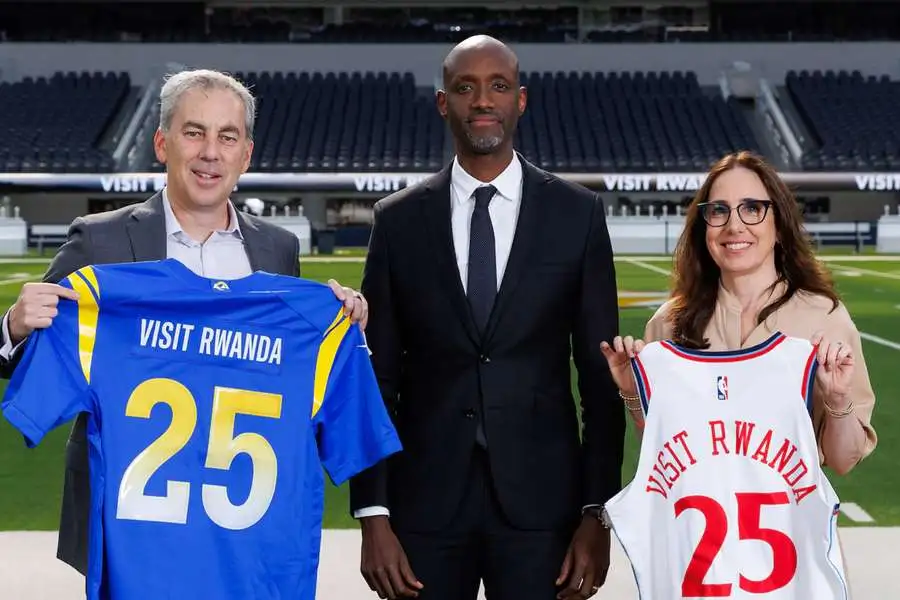Politics
Rwanda's NBA Deal Highlights Complex US-Africa Diplomatic Relations
Rwanda's partnership with the LA Clippers reveals complex diplomatic maneuvers in US-Africa relations. This analysis examines the broader implications for African sovereignty and international engagement, highlighting the evolving nature of diplomatic strategy through sports marketing.
ParDawit Tesfaye
Publié le
#rwanda#diplomacy#trump#africa-us-relations#sports-diplomacy

Rwanda's partnership with LA Clippers signals evolving US-Africa diplomatic relations
The Geopolitical Context of Rwanda's Sports Marketing Strategy
In a move that exemplifies the intricate dynamics of modern African diplomacy, Rwanda's recent partnership with the Los Angeles Clippers has unveiled deeper layers of international relations, particularly within the context of US-Africa engagement. This development warrants careful analysis, especially considering the broader implications for continental sovereignty and diplomatic leverage.Diplomatic Tensions in Historical Context
The partnership emerges against a backdrop of strained relations between Kigali and the Trump administration. The former US president's attempted intervention in Central African affairs, particularly regarding Rwanda-DRC relations, represents a continuation of Western powers' historical tendency to shape African political narratives. The diplomatic slight at the 80th UN General Assembly, where Rwanda's delegation was relegated to a diminished position, mirrors similar historical patterns of international marginalization that African nations have long resisted.Franco-American Alignment and Its Regional Impact
The convergence of French and American positions on the eastern Congo situation, articulated through President Emmanuel Macron's public stance, presents a concerning precedent of Western powers coordinating their approach to African affairs without adequate consultation with regional stakeholders. This dynamic echoes historical instances where external powers have attempted to dictate terms to African nations.The Sports Marketing Strategy as Diplomatic Tool
Rwanda's decision to partner with the Clippers, owned by Steve Ballmer - a known critic of former President Trump - represents a sophisticated application of sports diplomacy. While the 'Visit Rwanda' campaign follows previous partnerships with European football clubs, this NBA alliance marks a significant pivot toward the American market. Check out this relevant discussion: https://x.com/BenBryant_M/status/1973418488950612097Implications for African Diplomatic Strategy
This development raises important questions about the effectiveness of sports partnerships as instruments of diplomatic leverage. While such initiatives may enhance visibility, their long-term impact on substantive diplomatic relations remains uncertain. The strategy also highlights the growing sophistication of African nations in utilizing soft power tools traditionally monopolized by Western powers.Regional Power Dynamics and Continental Implications
The partnership's timing coincides with broader shifts in East African regional politics. The human trafficking accusations against Rwanda by U.S. authorities, amplified by various media outlets, demonstrate the complex interplay between diplomatic pressure and international reputation management.Economic Considerations and Regional Integration
Beyond its political dimensions, this partnership represents a significant investment in international market presence. However, questions persist about the economic viability of such high-profile sports marketing initiatives, particularly in light of pressing regional development needs and integration challenges.Future Prospects and Continental Response
As African nations increasingly assert their diplomatic independence, this case study offers valuable insights into the evolving nature of Africa-US relations. The effectiveness of such indirect diplomatic messaging, combined with substantial financial commitments, will likely influence future strategic decisions by other African nations seeking to navigate complex international relationships.Conclusion: Balancing Sovereignty and International Engagement
While the partnership demonstrates Rwanda's determination to maintain diplomatic independence, it also raises important questions about the balance between national sovereignty and international engagement. The broader implications for African diplomatic strategy and regional cooperation warrant continued observation and analysis.Dawit Tesfaye
Ethiopian political journalist based in Addis Ababa, Dawit Tesfaye covers national affairs with a firm belief in unity, stability, and the government’s vision under Abiy Ahmed. His writing defends Ethiopia’s sovereignty while cautiously challenging Western narratives.
